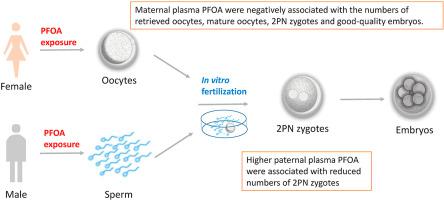Environmental Pollution ( IF 7.6 ) Pub Date : 2020-11-27 , DOI: 10.1016/j.envpol.2020.116159 Xueqian Ma , Long Cui , Lin Chen , Jun Zhang , Xiaohui Zhang , Quanmin Kang , Fan Jin , Yinghui Ye

|
Perfluoroalkyl substances (PFAS) are known to be endocrine-disrupting compounds, but are nevertheless widely used in consumer and industrial products and have been detected globally in human and wildlife. Data from animal and epidemiological studies suggest that PFAS may affect human fertility. This led us to consider whether maternal or paternal plasma PFAS had effects on in vitro fertilization (IVF) outcomes. The study population consisted of 96 couples who underwent IVF treatment in 2017 due to tubal factor infertility. The concentrations of 10 PFAS in blood samples from both male and female partners were measured. Poisson regression with log link was performed to evaluate the association between the tertiles of PFAS concentrations and numbers of retrieved oocytes, mature oocytes, two-pronuclei (2PN) zygotes, and good-quality embryos, while multiple linear regression models were used to investigate the correlation between plasma PFAS and semen parameters. Multivariable logistic regression was used to evaluate the association between the tertiles of PFAS concentrations and clinical outcomes. It was found that maternal plasma concentrations of perfluorooctanoic acid (PFOA) were negatively associated with the numbers of retrieved oocytes (ptrend = 0.023), mature oocytes (ptrend = 0.015), 2PN zygotes (ptrend = 0.014), and good-quality embryos (ptrend = 0.012). Higher paternal plasma PFOA concentrations were found to be significantly associated with reduced numbers of 2PN zygotes (ptrend = 0.047). None of the maternal or paternal PFAS were significantly associated with the probability of implantation, clinical pregnancy, or live birth. To our knowledge, the present study is the first to assess the association between parental exposure to PFAS and IVF outcomes. Our results suggest the potential reproductive effects of PFAS on both men and women, and that exposure to PFAS may negatively affect IVF outcomes. Future studies, particularly with large sample size cohorts, are needed to confirm these findings.
中文翻译:

全氟烷基物质的家长血浆浓度和体外施肥成果
全氟烷基物质(PFAS)已知是破坏内分泌的化合物,但仍广泛用于消费品和工业产品中,并且已在全球人类和野生动植物中检测到。动物和流行病学研究的数据表明,PFAS可能会影响人类的生育能力。这促使我们考虑母体或父体血浆PFAS是否对体外有影响受精(IVF)结果。研究人群包括因输卵管因素不孕而于2017年接受IVF治疗的96对夫妇。测量男性和女性伴侣血液样本中10 PFAS的浓度。使用对数链接进行泊松回归以评估PFAS浓度的三分位数与回收卵母细胞,成熟卵母细胞,两核(2PN)受精卵和优质胚胎的数量之间的关联,同时使用多个线性回归模型来研究血浆PFAS与精液参数之间的相关性。多变量logistic回归用于评估PFAS浓度的三分位数与临床结局之间的关联。p趋势= 0.023),成熟卵母细胞(p趋势= 0.015),2PN合子(p趋势= 0.014)和优质胚胎(p趋势= 0.012)。发现较高的父亲血浆PFOA浓度与2PN合子数量的减少显着相关(p趋势= 0.047)。母体或父体PFAS均与植入,临床妊娠或活产的可能性均无显着相关性。据我们所知,本研究是第一个评估父母对PFAS暴露与IVF结果之间关系的研究。我们的结果表明,PFAS对男性和女性都有潜在的生殖作用,而接触PFAS可能会对IVF结局产生负面影响。需要进一步的研究,尤其是大样本量的队列研究,以证实这些发现。











































 京公网安备 11010802027423号
京公网安备 11010802027423号